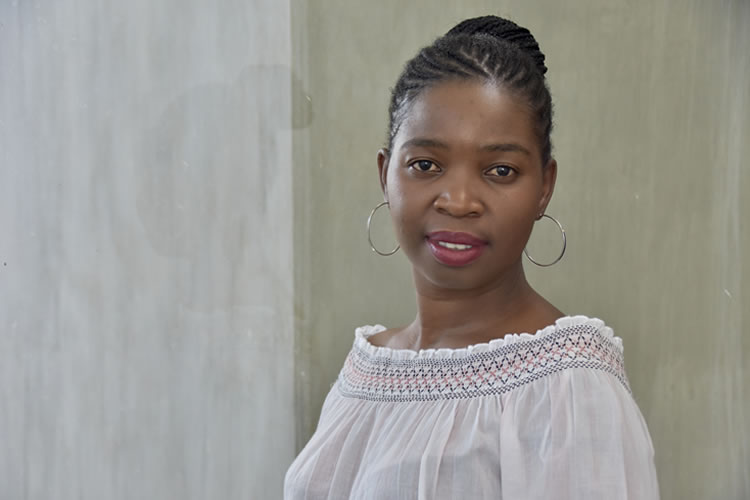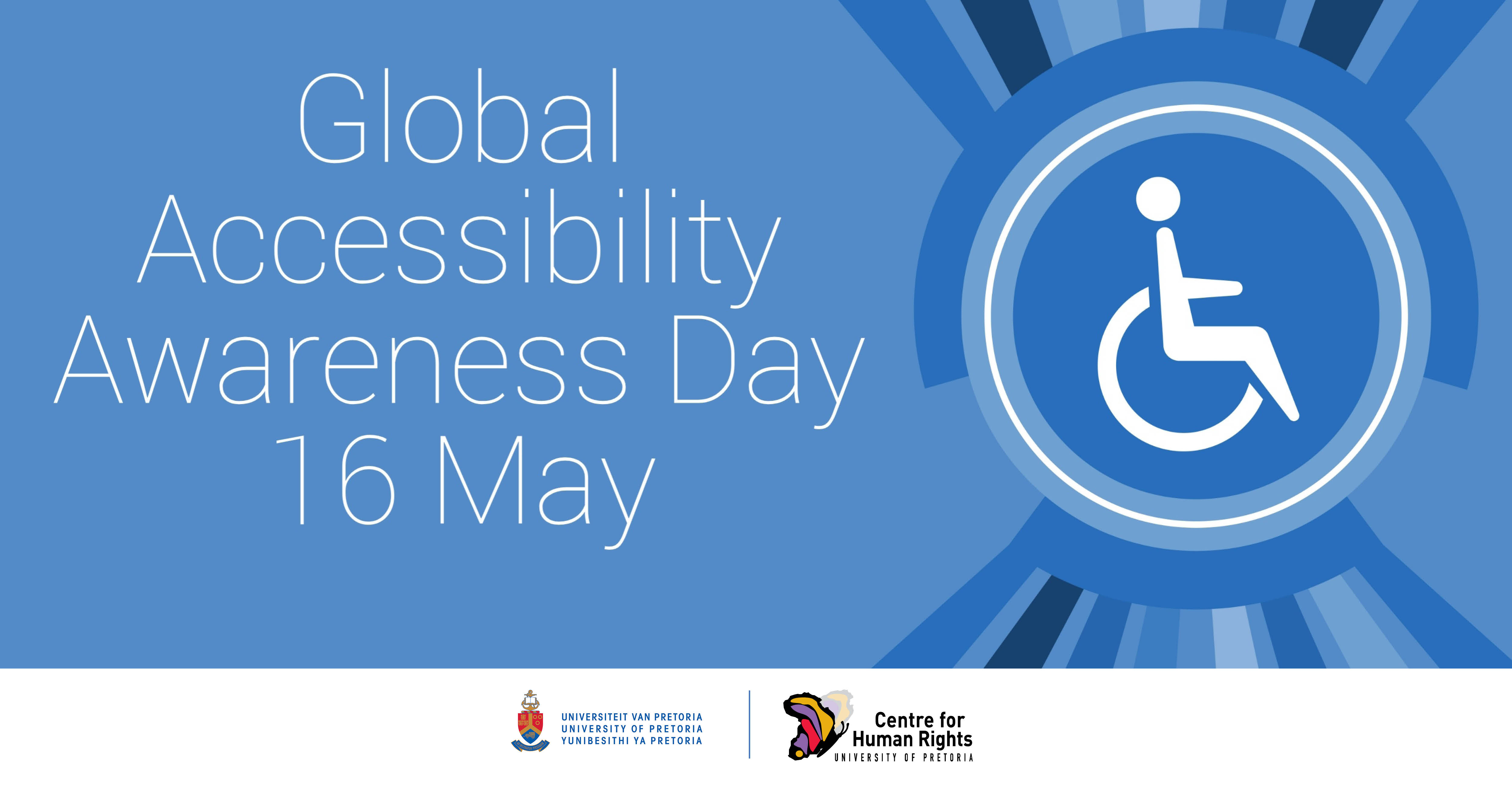The Centre for Human Rights, Faculty of Law, University of Pretoria, joins the rest of the world in commemorating Global Accessibility Awareness Day (GAAD). GAAD is an annual global observance held on the third Thursday of May to raise awareness and promote the significance of digital accessibility and inclusion for Persons With Disabilities (PWDs). GAAD promotes dialogue and education, aiming to empower over one billion individuals with disabilities to navigate the digital realm seamlessly. While GAAD primarily focuses on digital accessibility and inclusion for PWDs, its overarching goal is to promote awareness and understanding of accessibility issues in digital environments for all individuals. It also encompasses broader themes of inclusivity, which can include individuals from diverse cultural backgrounds. The 2024 GAAD is commemorated under the theme: ‘Built Without Barriers’, emphasising the importance of creating digital environments that are universally accessible and inclusive.
On this day, the Centre for Human Rights reflects on progress made in digitally integrating PWDs in Africa. Recognising the importance of access to Information and Communication Technologies (ICTs) for development and prosperity, the Centre reiterates the importance of global initiatives such as the United Nations Sustainable Development Goals (SDGs), particularly SDG 9, which prioritises the promotion of sustainable industrialisation and innovation, and building resilient infrastructure. Central to this goal is the need to significantly increase access to ICTs and strive to provide access to the internet in the least-developed countries by 2030. Despite the growing presence of ICTs in Africa, the digital divide and exclusion are pronounced, particularly digital accessibility. This divide and exclusion are evident in the discrepancies in access to digital devices, internet connectivity, and digital literacy across different regions and demographics within the continent. Bridging this gap is crucial for ensuring equitable participation in the digital sphere and harnessing the benefits of technological advancement for everyone including PWDs.
The challenges related to infrastructure and connectivity in Africa are varied including limited access to reliable internet and inadequate digital infrastructure in rural and remote areas. These hurdles not only impede independent economic integration and social inclusion but also pose significant barriers to PWDs, whose reliance on digital resources for communication, accessing essential services like healthcare and education, and even everyday activities such as mobility, is pronounced. The ramifications of inadequate connectivity and digital infrastructure extend far beyond mere inconvenience. They exacerbate the existing digital divide, magnifying the disparities in access and opportunity between urban and rural populations, as well as between individuals with and without disabilities. This stark inequality not only impedes the ability of PWDs to fully participate in society but also perpetuates systemic barriers to their autonomy and self-sufficiency. These hurdles are particularly daunting bearing in mind the sentiments by Judy Heumann, a disability rights activist that, ‘for people without disabilities, technology makes things easier. For people with disabilities, technology makes things possible.’ Therefore, addressing the infrastructure and connectivity issues in Africa is not merely a matter of technological advancement, it is about promoting inclusivity, empowering marginalised communities, and ensuring equitable access to opportunities for all.
On this occasion, it is also essential to recognise and reflect on the barriers PWDs face in accessing online content. The unequal distribution of online material between the global north and south exacerbates these challenges. In terms of accessibility features, content from the global north may be more likely to incorporate accessibility features such as screen reader compatibility, alternative text for images, and keyboard navigation. However, this is not consistently implemented across all online content, particularly in regions with less digital infrastructure or resources, such as the global south. As a result, PWDs in these regions may encounter fewer accessible options for engaging with online material. Moreover, much of the online content originating from the global north may be in languages that are not widely spoken or understood in the global south. This language barrier can present significant challenges for PWDs who rely on assistive technologies that may not support multiple languages or dialects. As a result, PWDs in the global south may struggle to find accessible content in their preferred language, further limiting their ability to access information and participate online. This reality inadvertently marginalises voices and perspectives from the global south, turning the digital landscape into a platform predominantly shaped by northern narratives. This imbalance not only perpetuates cultural homogeneity but also restricts meaningful participation on the internet. Addressing linguistic and cultural diversity is fundamental to ensuring digital accessibility and inclusion for PWDs. Promoting multilingualism not only enriches cultural representation but also enhances accessibility online. By advocating for linguistic inclusivity, we take crucial steps towards creating a digital environment where all individuals, including PWDs, can fully engage and contribute.
As we commemorate Global Accessibility Awareness Day, it is also important to recognise the strides made by big tech companies in enhancing digital accessibility. However, while efforts towards multilingualism are commendable, they alone cannot fully address the spectrum of barriers hindering digital inclusion. To effectively tackle digital exclusion, attention must also be directed towards empowering ‘internet non-users’ within marginalised communities. This involves initiatives aimed at enhancing digital literacy and skills, particularly among groups facing systemic disadvantages. In Africa, for instance, measures such as education and awareness campaigns play a pivotal role in promoting digital accessibility.
Digital inclusion is vital for social equity. Access to the internet not only facilitates participation in digital citizenship but also opens doors to countless opportunities. By equipping PWDs with digital skills, they are empowered to navigate digital platforms effectively and engage meaningfully with online content. However, the responsibility for promoting digital inclusion does not solely rest on big tech companies. Other stakeholders have a crucial role to play in ensuring that digital spaces are inclusive and easily accessible to all. Such concerted efforts not only motivate and inspire confidence among persons with disabilities but also promote a more inclusive digital ecosystem for everyone.
With the rapid advancement of digital technologies, there is a growing need to ensure that the ‘same rights that people have offline are also protected online.’ In line with international human rights frameworks such as the African Commission on Human and Peoples’ Rights (ACHPR) Declaration of Principles on Freedom of Expression and Access to Information in Africa states are called to ensure that there is ‘universal, equitable, affordable and meaningful access to the internet’. Similarly, the ECOWAS Information and Communication Technology Accessibility Policy calls on all member states to ensure that digital accessibility is inclusive of PWDs. Compliance with these standards ensures that human rights such as freedom of expression and access to information are realised without discrimination.
Moreover, compliance with these standards also fosters inclusivity but mitigates legal risks and demonstrates commitment to accessibility and equality. By adhering to these principles, organisations contribute to the digital inclusion of PWDs, thereby promoting a more accessible and equitable digital landscape for all.
Technological innovations and locally-driven solutions stand as key drivers of digital inclusivity in Africa, playing a critical role in addressing digital accessibility challenges. Through leveraging technologies such as mobile applications, low-cost devices, and community-based internet cafes, communities can enhance access to the internet and subsequently improve access to services such as healthcare and education. Although digital technologies have addressed some elements of inequalities, more needs to be done to ensure that there is balance and inclusion for PWDs. It is in this regard that the African Union High Level Panel on Innovation and Emerging Technologies (APET) is encouraging African States to consider investing more in assistive emerging technologies that can address challenges affecting PWDs. This strategic investment has the potential to empower PWDs, enabling them to actively contribute to Africa’s socio-economic development.
As we mark this year’s Global Accessibility Awareness Day, we must recognise the pivotal role of engaging with PWDs to enhance digital inclusion and accessibility. Their invaluable feedback and insights are essential for ensuring that digital products and services are tailored to meet their diverse needs and preferences. The Centre for Human Rights therefore urges stakeholders to take proactive measures to prioritise the accessibility of their websites and digital platforms for PWDs. By actively incorporating accessibility features and considering the input of PWDs during the design and development process, we can create a more user-friendly and inclusive online environment. It is in this regard that the GAAD serves as a catalyst for removing barriers and striving towards equal opportunities for individuals, irrespective of their disabilities. This year, GAAD aims to deepen understanding among technology creators and users by amplifying the voices and experiences of people with disabilities. Through concerted collective efforts, we can promote empathy, drive positive change, and ultimately pave the way towards greater digital accessibility and inclusion for all.
For media inquiries, please contact:

Expression, Information and Digital Rights Unit
Tel: +27 (0) 12 420 4199
Fax: +27 (0) 86 580 5743
hlengiwe.dube@up.ac.za

Expression, Information and Digital Rights Unit
Tel: +27 (0) 12 420 3810
Fax: +27 (0) 86 580 5743
Ompha.Tshamano@up.ac.za


